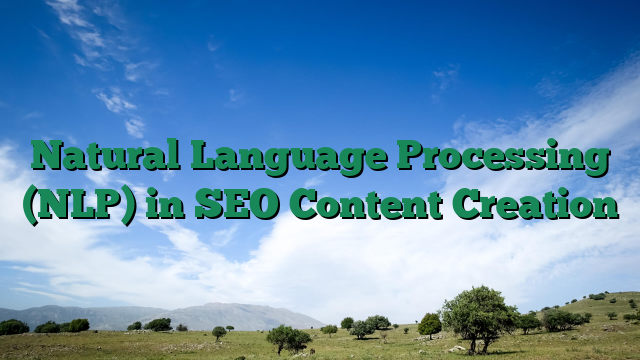Natural Language Processing (NLP) in SEO Content Creation
Imagine this: You’ve spent hours crafting the perfect blog post, optimizing it with keywords, and hitting “publish” with high hopes. But days later, your traffic is flat, and your bounce rate is through the roof. Sound familiar? The problem isn’t your effort—it’s your approach. Enter Natural Language Processing (NLP), the game-changer in SEO content creation. By leveraging NLP SEO, sentiment analysis, and user intent optimization, you can create content that resonates with both search engines and real people.
In this post, we’ll dive into how NLP can transform your SEO strategy, boost your rankings, and even open doors to monetization opportunities. Whether you’re a blogger, marketer, or side hustler, this is your blueprint to smarter, more effective content creation.
The Basics of NLP in SEO
What is NLP, and Why Does It Matter for SEO?
Natural Language Processing (NLP) is a branch of artificial intelligence that helps machines understand, interpret, and generate human language. In the context of SEO, NLP bridges the gap between how people search and how search engines interpret those queries.
For example, when someone types “best coffee shops near me,” Google doesn’t just look for pages with those exact words. It uses NLP to understand the intent behind the query—whether the user wants reviews, directions, or recommendations.
How Search Engines Use NLP
search engines like Google have evolved beyond simple keyword matching. They now analyze:
– Context: What’s the topic of the page?
– Sentiment: Is the content positive, negative, or neutral?
– User Intent: Is the searcher looking to buy, learn, or compare?
By understanding these factors, you can create content that aligns with what both users and algorithms want.
Improving Content Relevance with NLP
Step 1: Focus on User Intent
User intent is the backbone of NLP-driven SEO. There are three main types of intent:
1. Informational: Users want answers (e.g., “What is NLP?”).
2. Navigational: Users are looking for a specific site (e.g., “TheBizWizAcademy login”).
3. Transactional: Users are ready to take action (e.g., “Buy SEO tools”).
To optimize for intent:
– Research common queries in your niche using tools like Google’s “People Also Ask” or AnswerThePublic.
– Create content that directly addresses these queries.
Step 2: Use Semantic Keywords
NLP helps search engines understand related terms and synonyms. For example, if your main keyword is “NLP SEO,” you can also include terms like “AI content optimization” or “sentiment analysis SEO.”
Pro Tip: Use tools like Surfer SEO or Clearscope to identify semantic keywords and improve your content’s relevance.
Sentiment Analysis for User Intent
What is Sentiment Analysis?
Sentiment analysis is an NLP technique that determines the emotional tone behind a piece of text. For SEO, this means understanding whether your content aligns with the user’s emotional state.
For example:
– A user searching for “how to fix a broken phone” is likely frustrated. Your content should offer empathy and quick solutions.
– A user searching for “best vacation spots” is likely excited. Your content should inspire and provide actionable tips.
How to Apply Sentiment Analysis
- Analyze Your Audience: Use tools like Brandwatch or Hootsuite Insights to gauge your audience’s sentiment.
- Tailor Your Tone: Match your content’s tone to the user’s emotional state.
- Test and Optimize: Use A/B testing to see which tone resonates best with your audience.
Tools Integrating NLP for SEO
1. Surfer SEO
Surfer SEO uses NLP to analyze top-ranking pages and provide actionable recommendations. From keyword density to content structure, it’s a must-have for NLP SEO enthusiasts.
2. Clearscope
Clearscope helps you create content that aligns with search intent by analyzing top-performing pages and suggesting relevant terms.
3. Grammarly
While primarily a writing tool, Grammarly uses NLP to improve readability, tone, and grammar—key factors for SEO.
Monetization Potential of NLP-Driven Content
Turn Your Content into a Side Hustle
By mastering NLP SEO, you can create content that not only ranks but also converts. Here’s how to monetize:
1. Affiliate Marketing: Promote tools like Surfer SEO or Clearscope and earn commissions.
2. Freelance Writing: Offer NLP-optimized content creation services to businesses.
3. Digital Products: Create and sell eBooks or courses on NLP-driven SEO strategies.
Build a Profitable Blog
With NLP-optimized content, you can attract more traffic and monetize through:
– Ad Revenue: Use platforms like Mediavine or AdThrive.
– Sponsored Posts: Partner with brands in your niche.
– Membership Sites: Offer exclusive content or tools for a subscription fee.
Conclusion
Natural Language Processing (NLP) is no longer a buzzword—it’s a necessity for modern SEO. By understanding user intent, leveraging sentiment analysis, and using the right tools, you can create content that ranks, resonates, and generates revenue.
Whether you’re looking to grow your blog, start a side hustle, or build a full-time online business, NLP is your secret weapon. And if you’re ready to take your skills to the next level, TheBizWizAcademy.com offers affordable, step-by-step training and a supportive community to help you succeed.
So, what are you waiting for? Start optimizing your content with NLP today and watch your online business thrive!
External Links:
- CTA: Ready to master NLP-driven SEO? Join TheBizWizAcademy today and unlock your blueprint to online business success!
🚀 Want to level up your online business? Join TheBizWizAcademy and start Networking and Learning!
